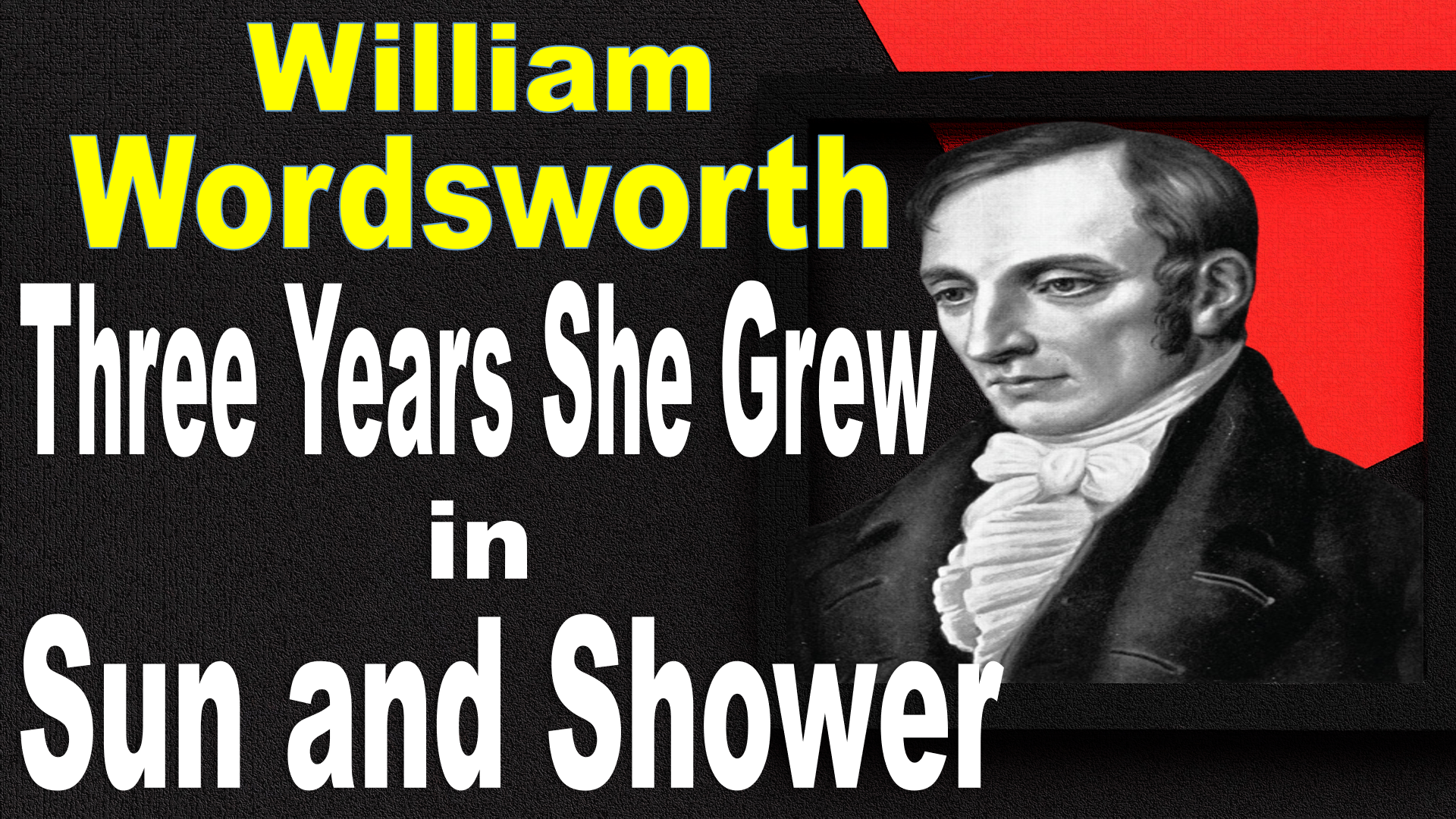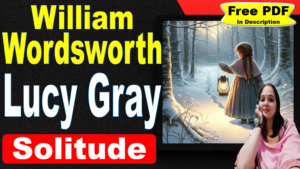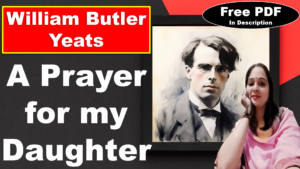Three Years She Grew Analysis
Stanza 1
Three years she grew in sun and shower,
Then Nature said, “A lovelier flower
On earth was never sown;
This Child I to myself will take;
She shall be mine, and I will make
A Lady of my own.
Explanation: In the opening lines of “Three Years She Grew,” Wordsworth introduces Lucy, who has grown for three years under the nurturing forces of “sun and shower,” symbolic of life’s balance of joy and hardship. Nature personifies herself and declares that Lucy is the most beautiful flower ever sown on Earth, implying that her beauty and grace are unparalleled. Nature then claims Lucy for herself, stating that she will nurture and shape her into “a Lady of my own.” This suggests that Nature will take responsibility for Lucy’s development, guiding her growth and shaping her personality in harmony with the natural world.
Personification: Nature is personified as a nurturing, motherly figure who takes Lucy under her care. This adds a personal, intimate tone to Nature’s role in Lucy’s life.
Metaphor: Lucy is compared to a “lovelier flower,” signifying her beauty, innocence, and purity. The flower metaphor represents her natural growth and connection to the earth.
Alliteration: The phrase “sun and shower” uses alliteration (the repetition of the ‘s’ sound) to create a smooth and rhythmic flow, emphasizing the natural cycles of life and growth.
Symbolism: The “sun and shower” symbolize life’s nurturing forces, representing joy and struggle, which contribute to Lucy’s growth.
Stanza 2
“Myself will to my darling be
Both law and impulse: and with me
The Girl, in rock and plain,
In earth and heaven, in glade and bower,
Shall feel an overseeing power
To kindle or restrain.
Explanation: In this stanza, Nature promises to be both “law and impulse” for Lucy, indicating that she will guide Lucy’s life through both structure and instinct. Nature will govern Lucy’s actions with laws of order, but at the same time, she will allow Lucy the freedom to follow natural impulses. The phrase suggests a balanced influence of control and freedom, where Nature ensures Lucy’s development in harmony with the world around her.
Nature states that Lucy, under her guidance, will feel a powerful presence in all surroundings, from “rock and plain” to “earth and heaven” and “glade and bower.” These images reflect the wide expanse of the natural world, implying that wherever Lucy goes, she will be under Nature’s watchful eye, feeling its constant influence. This “overseeing power” will either inspire Lucy (kindle) or hold her back (restrain), shaping her emotional and moral life.
Poetic Device:
Personification: Nature is again personified as a conscious being capable of exerting “law” and “impulse” over Lucy’s life, giving Nature an almost parental role in Lucy’s growth.
Antithesis: The use of contrasting ideas, like “law and impulse” and “kindle or restrain,” highlights the balance between freedom and control that Nature will provide Lucy, emphasizing the dual forces shaping her development.
Imagery: Words like “rock and plain,” “earth and heaven,” “glade and bower” create vivid images of different aspects of nature, representing the vastness of Nature’s presence in Lucy’s life.
Symbolism: “Rock,” “plain,” “earth,” “heaven,” “glade,” and “bower” symbolize different natural elements, representing the variety of environments where Lucy will feel Nature’s influence.
Stanza 3
“She shall be sportive as the fawn
That wild with glee across the lawn
Or up the mountain springs;
And hers shall be the breathing balm,
And hers the silence and the calm
Of mute insensate things.
Explanation: In these lines, Nature describes how Lucy will embody the playful spirit of a young fawn, full of energy and joy, “wild with glee” as it leaps across the lawn or bounds up a mountain. This imagery emphasizes Lucy’s innocence, vitality, and connection to the natural world, portraying her as free-spirited and full of life. Nature intends to bestow upon Lucy the qualities of youth, movement, and exuberance, like the carefree fawn.
Additionally, Lucy will also possess the calming and peaceful qualities of nature, symbolized by “the breathing balm” and “the silence and the calm of mute insensate things.” This suggests that Lucy will inherit not only nature’s liveliness but also its tranquility and stillness. “Breathing balm” evokes a soothing, healing presence, while “mute insensate things” (like rocks, trees, or clouds) represent the quiet, unmoving aspects of nature. Together, these lines suggest that Lucy will find balance between playful energy and serene stillness, embodying the full spectrum of nature’s influence.
Poetic Device:
Simile: Lucy is compared to a “fawn” through a simile, which emphasizes her playful, innocent, and energetic qualities.
Imagery: Vivid images of a fawn leaping “across the lawn” and “up the mountain springs” evoke freedom and vitality. Similarly, “breathing balm,” “silence,” and “calm” create a contrasting image of peacefulness and stillness.
Symbolism: The “fawn” symbolizes youth, joy, and innocence, while “mute insensate things” symbolize the quiet, inanimate aspects of nature, such as rocks or trees, representing stability and calm.
Contrast: The juxtaposition between the lively “fawn” and the calm of “mute insensate things” highlights the duality in Lucy’s character—both full of life and peace.
Stanza 4
“The floating clouds their state shall lend
To her; for her the willow bend;
Nor shall she fail to see
Even in the motions of the Storm
Grace that shall mould the Maiden’s form
By silent sympathy.
Explanation: In this stanza, Nature continues to describe the qualities Lucy will inherit. The “floating clouds” will lend their peaceful, gentle demeanor to her, and the “willow” will bend gracefully for her, symbolizing nature’s willingness to accommodate her presence. Lucy will have an intimate connection with all elements of nature, even seeing beauty and grace in something as powerful and chaotic as a storm. The storm, usually associated with violence and disorder, will impart a subtle, graceful influence upon Lucy, shaping her in a quiet, almost imperceptible way, described as “silent sympathy.”
Nature suggests that Lucy will develop an understanding of the world around her, even finding beauty and harmony in the most tumultuous elements. Her character will be molded by her connection with both the gentler and more forceful aspects of nature, reinforcing the idea that Lucy’s personality is being shaped by a delicate balance of calmness and strength.
Poetic Device:
Personification: The clouds “lend their state” and the willow “bend” for Lucy, giving these natural elements human-like qualities to show their gentle interaction with her.
Symbolism: The “floating clouds” symbolize peace, serenity, and grace, while the “storm” represents the more turbulent aspects of life. Lucy’s ability to see grace in the storm suggests her capacity to find beauty in hardship.
Alliteration: The repetition of the ‘s’ sound in “silent sympathy” adds to the fluidity and calm of the stanza, emphasizing the quiet, almost mystical influence nature will have on Lucy.
Imagery: Vivid descriptions like “floating clouds,” “the willow bend,” and “motions of the storm” create a picture of nature’s contrasting elements working together to shape Lucy’s character.
Contrast: The gentle, calm “clouds” and the powerful “storm” create a contrast that reflects the range of influences on Lucy, from serenity to strength.
Oxymoron: “Silent sympathy” combines opposing ideas, suggesting a quiet, non-verbal form of understanding between Lucy and nature.
Stanza 5
“The stars of midnight shall be dear
To her; and she shall lean her ear
In many a secret place
Where rivulets dance their wayward round,
And beauty born of murmuring sound
Shall pass into her face.
Explanation: In these lines, Nature promises that Lucy will find a deep connection with the beauty of the natural world, even at night. The “stars of midnight” will be dear to her, symbolizing her appreciation for the quiet, mysterious aspects of nature. Lucy will also listen closely in “many a secret place,” where she will hear the sounds of nature, such as the soft murmuring of rivulets (small streams) as they flow unpredictably. These gentle, wayward movements and their musical sounds will influence her so deeply that their beauty will “pass into her face,” suggesting that the grace and tranquility of nature will be reflected in her appearance and character.
This stanza highlights the theme of harmony between Lucy and the natural world, suggesting that her connection with nature will not only shape her thoughts but also become visible in her physical form. The music of the streams and the serene beauty of the stars will become a part of her, symbolizing her deep spiritual and emotional bond with nature.
Poetic Device:
Personification: Nature is personified through phrases like “rivulets dance their wayward round,” giving streams human-like qualities to emphasize their lively and playful movements.
Imagery: Vivid imagery is used to depict the nighttime scene with “stars of midnight” and “rivulets dancing,” creating a serene, peaceful picture of nature that Lucy will find beautiful and inspiring.
Symbolism: The “stars of midnight” symbolize mystery, tranquility, and beauty, while the “rivulets” represent the unpredictable and flowing aspects of nature. Both elements shape Lucy’s inner and outer beauty.
Metaphor: The beauty of nature “passing into her face” is a metaphor for how deeply Lucy’s soul and appearance will be shaped by her connection with the natural world.
Stanza 6
“And vital feelings of delight
Shall rear her form to stately height,
Her virgin bosom swell;
Such thoughts to Lucy I will give
While she and I together live
Here in this happy dell.”
Explanation: In this stanza, Nature continues to describe how Lucy will grow under its nurturing influence. The “vital feelings of delight” Lucy experiences from her connection with nature will raise her “to stately height,” both literally and metaphorically. This suggests that Lucy will not only grow tall and physically graceful but also develop an inner nobility and strength. Her “virgin bosom swell” refers to her youthful purity and the blossoming of her womanhood, symbolizing both her physical growth and emotional maturity.
Nature promises to fill Lucy’s mind with uplifting and beautiful thoughts, which will shape her character while they live together in the “happy dell,” a secluded and peaceful valley. The use of “together” indicates that Nature and Lucy are deeply intertwined, with Nature acting as both a guardian and a source of inspiration. The “happy dell” symbolizes a serene, idyllic setting where Lucy will thrive under Nature’s care.
Poetic Device:
Personification: Nature is again personified, acting as a nurturing force that gives Lucy both physical and emotional growth.
Imagery: Phrases like “vital feelings of delight,” “stately height,” and “virgin bosom swell” create vivid images of Lucy’s physical and emotional development, portraying her as a figure of grace and purity.
Symbolism: The “vital feelings of delight” symbolize the joys and experiences Lucy derives from her relationship with nature, while “stately height” represents her inner and outer growth. The “virgin bosom” symbolizes innocence and the blossoming of youth.
Metaphor: “Vital feelings of delight” metaphorically suggests that Lucy’s growth and maturity are driven by the emotional and spiritual nourishment she gains from nature.
Enjambment: The continuation of thoughts over multiple lines without pause (e.g., “Such thoughts to Lucy I will give / While she and I together live”) creates a flowing, harmonious rhythm, mirroring Lucy’s seamless growth in nature.
Stanza 7
Thus Nature spake—The work was done—
How soon my Lucy’s race was run!
She died, and left to me
This heath, this calm and quiet scene;
The memory of what has been,
And never more will be.
Explanation: In the final stanza, the speaker reflects on Lucy’s death, marking the end of her brief life. Nature’s work in nurturing and shaping Lucy is complete, but tragically, her life is cut short. The line “How soon my Lucy’s race was run!” underscores the suddenness and brevity of her existence. Lucy has died, leaving the speaker with only the landscape she inhabited—the “heath” and the “calm and quiet scene”—as a reminder of her presence.
The speaker now has only the “memory of what has been,” suggesting a sense of loss and longing for Lucy, whose beauty and vitality once brightened the natural world around her. The final line, “And never more will be,” emphasizes the permanence of her absence, highlighting the theme of transience and the finality of death. Nature, which once nurtured Lucy, now stands as a backdrop to her memory, leaving the speaker to mourn the loss of what can never return.
Poetic Device:
Personification: Nature is personified as speaking and completing her work, underscoring her role in Lucy’s life and growth.
Metaphor: “Lucy’s race” is a metaphor for her life, comparing it to a race that has been run and finished too soon, highlighting the fleeting nature of life.
Imagery: The “heath” and “calm and quiet scene” create a peaceful yet melancholic image of the landscape left behind after Lucy’s death, symbolizing both serenity and loss.
Contrast: The lively and joyful imagery from earlier stanzas contrasts sharply with the stillness and finality of death in these lines, emphasizing the shift from life to loss.










